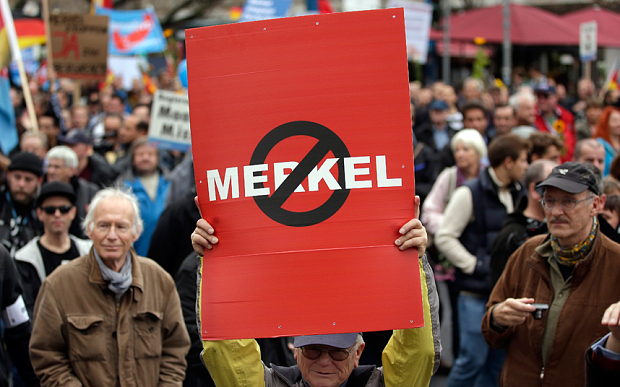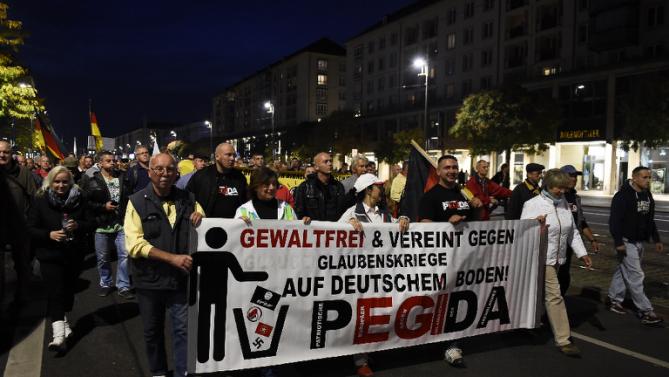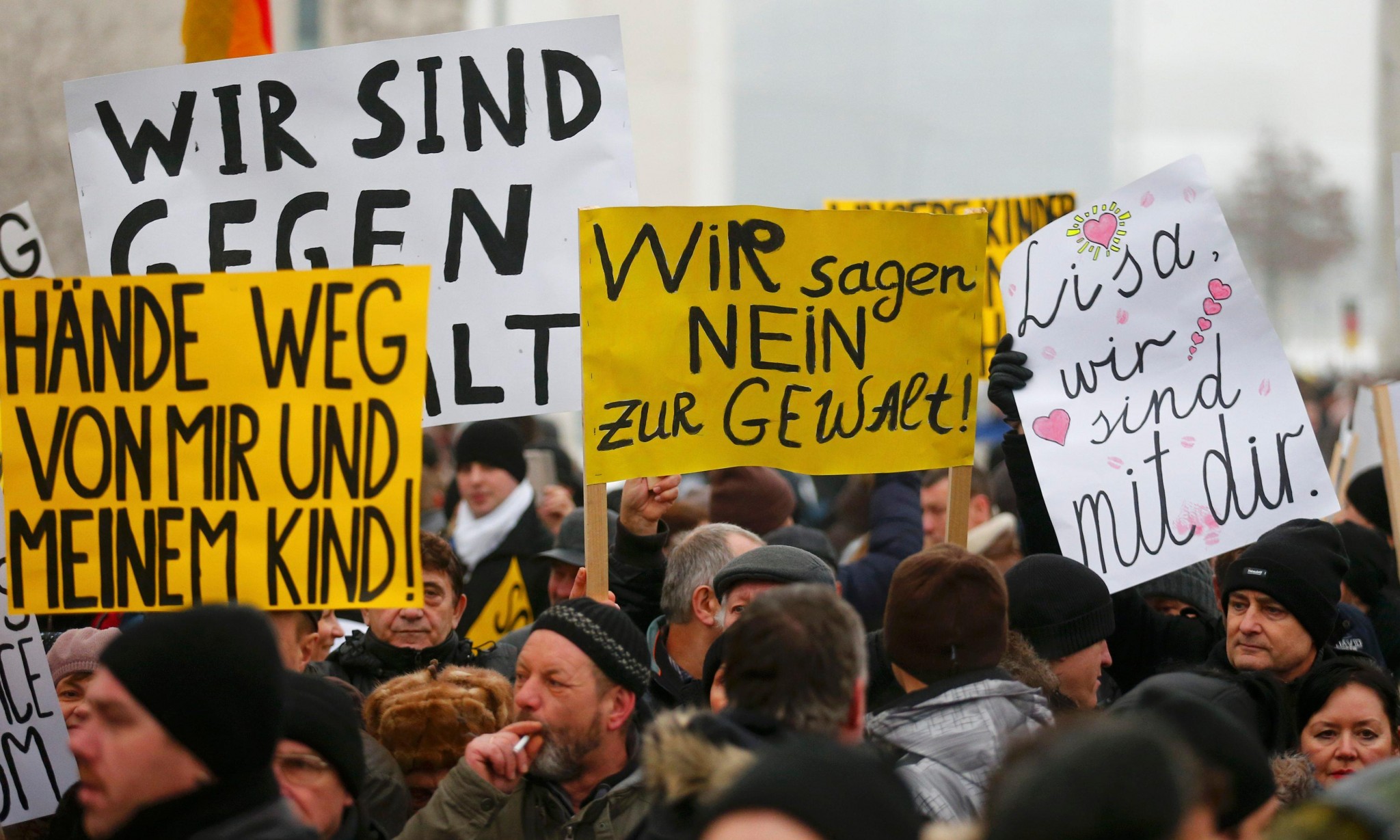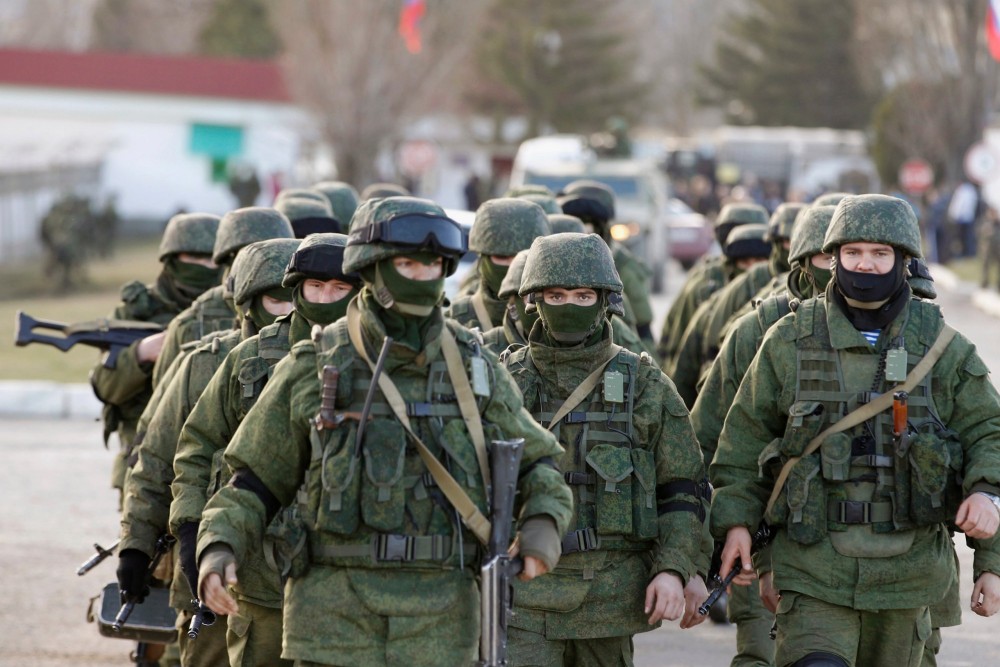Knowing of how to confront Russia has not been a German virtue. Historically, cooperation has worked much better – for both sides. During the Cold War, a “change through rapprochement” became the official policy of the German Federal Republic when Willy Brandt was elected Chancellor in 1969.
The rapprochement with Russia (in reality the rapprochement with the Soviet Union was only a rapprochement with Russia) later became known as “Ostpolitik”. Germany largely has upheld the narrative that rapprochement and not so NATO’s military deterrence guaranteed world peace during this period. The Russian occupation of Crimea, Russia’s war in the Donbas and on Syria have not changed the German political approach of regarding Russia as a partner.
This was very well underlined by the recent meeting of the Minister-President of Bavaria and head of the conservative party CSU, Horst Seehofer, with the Russian president in Moscow (accompanied by the former Minister-President of Bavaria Edmund Stoiber whose critical view of Merkel also has been very present in German media and talkshows recently).
The Russian occupation of Crimea, Russia’s war in the Donbas and on Syria have not changed the German political approach of regarding Russia as a partner.
Seehofer is not just another western politician meeting the Russian president and calling for an end to the sanctions against Russia. He is one of the most powerful politicians in Germany, with ambitions to become the next German Chancellor should Merkel not find adequate answers to the mass migration to Germany and lose power.
Seehofer far better reflects German elite attitudes towards Russia than Merkel does, and the unusual critique from media and German politicians that accompanied his visit has rather to be interpreted as an attempt to mask the fact that the majority of the German elite has a supportive attitude towards Russia (see also here).
It has been thanks to the strong position of Chancellor Merkel that Germany has supported sanctions against Russia that are now valid until summer 2016 – much to the discontent of Russia. But the position of the chancellor has been weakened significantly in the recent months, largely because she failed to enact measures stopping mass migration to Germany.

Additionally, politics and media for several months offered a distorted view on the issue. Those failures have added more frustration to previous political failures, such as the bail-out of Greece or the famous “Energiewende”, basically demonizing nuclear energy. The disappointment with a German government that rules under conditions of an inexistent democratic-minded parliamentarian opposition contesting political decisions has reached a peak for many ordinary citizens, and caused a serious state crisis.
This crisis has opened up an important window of opportunity for the adversaries of the chancellor. Those are of course the leaders of the other important political parties with ambitions of being the next leader of Germany. We also have to add Russia that wants the sanctions to be lifted, and tries to undermine the position of the German political leadership. The determination of Russia to get rid of Merkel has not been grasped in Berlin until recently.
What has not been said openly yet – in spite of being a regular Russian strategy – is that Russia will ally with Merkel’s political adversaries in Germany in order to undermine her authority. The example of Ukraine, namely the failure of Yulia Tymoshenko’s alliance with Putin in order to undermine the presidency of Viktor Yushchenko (that ultimately brought the autocratically ruling Viktor Yanukovych to power) should be a warning to all of those who think that alliances with Russia pay out.
Russia will ally with Merkel’s political adversaries in Germany in order to undermine her authority.
In regard to Russian efforts to further destabilize the situation several other points are of relevance here: the nature of German mass media, the fact that hundreds of thousands predominantly Muslim men came to Germany since summer 2015, the role of the Russian-speaking minority in Germany, and the failure to grasp the significance of “provokatsija”.
German mass media and political talk-shows on TV have (until now) carelessly reproduced Russian views on the situation in Ukraine and Syria.
One line of action has been that Russian friendly producers have invited well-knownsupporters of the Russian world view to prime time talkshows, where they could argue for months that Russia had no troops on Crimea or that Russia was only bluffing with „military exercises“, while shelling Ukraine from Russia and sending military material into Ukraine in early summer 2014.
Rarely someone from Ukraine was invited to those shows, Russians or their German apologists explaining the situation for the German audience. Subsequently, there has been practically no information on how Russian troops invaded Ukraine in summer 2014 or how they were engaged at Debaltseve in February 2015, the famous cease-fire already being in effect. The same persons continue to be invited to the shows and downplay aggressive Russian positions, still arguing the Russian political leadership and military pose no threat to world peace or (eastern) Europe.
Another important pillar are news agencies such as Reuters or DPA. Two characteristics of press agencies support propaganda and disinformation: Daily short news items are reprinted in main stream media without further reflection and a lot of information is released anonymously, so it is hard to track back the person responsible for spreading pro-Russian views – for a recent DPA example on how the praise of Russia’s role in Syria made it down to important German mass media see here.
Then, there are the German-speaking correspondents in Russia who of course report from a Russian point of view on events in Ukraine and beyond (one of them was candidate for the German-Russian foreign commerce chamber). As of now it should be widely known that only the official view can be reported from a Moscow-bureau. Evidently, there is not much enthusiasm to cover Russian defense spending, mobilization efforts and the nature of military exercises, as well as the destructive role of Russian special services and their possible involvement in creating terrorist groups and/or terrorist attacks abroad.
In the cases where Russian anchors, fringe politicians or „scientists“ have praised their capabilities in Syria or pressured military action against Ukraine/the Baltic states orTürkiye (while building up military capabilities against all of those), their western counterparts have been quick to downplay the issue for the western audience, also offering a convenient excuse for western politics to remain passive in regard to Russia.
Provocations play with the emotions of ordinary people, journalists or politicians – and emotions prevent a clear-cut analysis of events.
Pro-Russian views of influential German opinion makers are regularly and prominently published in popular online and print mass media – with at least the implicit support of publishers and chief editors (for an example see here).
The Russian media outlets RT Deutsch or Sputnik with their radical anti-American and anti-EU reporting are instruments to push mass media further toward Russian views; pro-Russian commenting in online media or letters to the editor serve the same function. Any analyst will observe that the overwhelming majority of comments or letters regarding Russian activities are of an affirmative or explanatory character (with a significant activity of trolls, „useful idiots“ and „experts“).
This phenomenon follows a simple logic: the more pro-Russian and anti-American comments the editor receives, the more he will tend to satisfy its readers with his own reporting in order not to annoy the „audience“ and to receive positive feedback (for an example what happens if one does not stick to this rule see here). At the same time, crucial members of pro-Russian German circles have (falsely) argued German media are aggressively attacking Russia (for an example see here).
Of how strong Russian positions are in Germany can be best illustrated by the fact that a German parliamentarian deputy recently decided to come out with critique on Russia –anonymously. When asked if he should not openly address the issue in his function as parliamentarian – he found that it was the role of the security agencies.
This is the next problem – security agencies in Germany have employed persons from eastern Germany with communist secret service (Stasi) contacts after the reunification of Germany, among them experts for foreign espionage. Some of them in crucial positions might have continued to work for Russia. It is unclear how urgent the problem is as the issue has not been brought up in the context of Russian activities in Germany.
What is known, however, is that there have been several members of the communist parliamentary party Die Linke who reportedly worked for communist secret services (one of the suspected even wants to ensure the access to the German parliament for a former left-wing extremist terrorist).
There are some indications that Russian security agencies have been involved in efforts to destabilize Germany: Ulrich Wickert, who formerly presented the news show Tagesthemen suggested that the use of the term “Lügenpresse” (lying press) could have been supported by Russian special services. The term has a long history of use, and since autumn 2014 became popular again as slogan during “Pegida” and later AfD demonstrations, basically directed against a distorted press coverage of (Muslim) immigration to Germany. The term also has been pushed by the heavily pro-Russian magazine Compact and persons involved around it (who also have spoken at “Pegida” and AfD events; and at least for the AfD there have been indications for Russian financing, while some members have met with Russian diplomats).

On 15 December 2015, there was an event that managed to further undermine the credibility of German media, implicitly suggesting “Lügenpresse” applied to the most established German media. The Second German Television ZDF then broadcasted the documentary “Machtmensch Putin”.
It related Putin’s way to power, and had some facts on current Russian politics. Moreover, the ZDF presented “Igor” who claimed to have fought in the Donbas on the side of Russia. Interestingly, Russian propagandist Kiselev took up the issue in his weekly news show on Rossija 1. His goal was to show Germany had presented a „fake separatist“ in order to fool the audience: “Igor” stepped out as “Jurij Labyskin” saying he had been paid for the statement that Russians had been fighting in Ukraine, and accused the ZDF-producer in Moscow, Bobkov, of being responsible. As a result, German media outlets as Tagesspiegel, Süddeutsche, Badische Zeitung, focus.de,Tagesanzeiger, stern.de uncritically repeated the accusations of Kiselev that the ZDF had it all made up.
But the story went on: The journalists Moritz Gathmann und Maxim Kireev went to Kaliningrad in order to meet Labyskin. It came out, Labyskin had been under the control of the FSB (he claimed since September 2015). Interestingly, German-language media such as the NZZ, Stern or Huffington Post again blamed the ZDF for having worked unprofessionally, unconsciously supporting the above claims German-language main stream press is a “Lügenpresse”.
The real issue was not brought up by the press as it would have touched the taboo-topic of Russian FSB activities: It was the fact that the FSB had successfully manipulated a German documentary on the Russian president and his war in the Donbas in order to discredit German main stream media.
We also have to take into account hundreds of thousands of Russlanddeutsche, persons who migrated from the Soviet Union to Germany after 1991. As a result of Russia’s war against Ukraine, they even more turned to Russi state TV and largely back the Russian narrative. They some days later watched Kiselev’s version of events on the ZDF-documentary, suggesting German TV had presented a fake separatist.
The more the chancellor has isolated herself since early autumn 2015, the bolder Russia acts have become (e.g. Rossijskaja Gazeta saw the beginning of the end of Merkel andKomsomolskaja Pravda related that thousands requested Merkel to resign in January 2016); using the negative aspects of mass migration for propaganda purposes in Russia well-knowing that millions of Russian-speaking persons watch Russian state TV abroad.
Yet there was more, this time directly connected to the Russian-speaking minority in Germany: On 16 January, the fake story of a young girl, the Russlanddeutsche “Lisa” was presented on Russia’s Pervyj Kanal, and its Berlin correspondent Ivan Blagoj argued she had been raped by migrants.
There had been nothing on “Lisa” in the German media, and it was suggested that German authorities had been ordered to cover-up the issue. The video of the Russian news item additionally was posted by „Anonymous“ on Facebook and viewed 1.737.210 times so far, with thousands of anti-Merkel and anti-migrant comments (this by the way is another example of Facebook’s lax policy toward Russian propaganda).
Outrage of the Russian-speaking community was fueled by extensive Russian media coverage and on Russian social networks. The Russian embassy protested when the German lawyer Martin Luithle pressed charges against Blagoj; arguing this would provoke German authorities to restrict the work of a Russian journalist. On the side of theRusslanddeutsche, the story of Lisa added to existing frustrations (and misperceptions) in regard to unregulated mass migration.
Some 10.000 mostly Russian-speaking persons participated in protests all over Germany – observers pointed to pressure via Facebookand suggested that agitators had been involved in order to bring those people together (see a general assessment, or the examples of Lahr and Berlin). Moreover, Russia used fake actressess and fake witnesses in order to push its cause: This time however they would not relate how horrible Ukrainians, but migrants are.
Efforts have been evident to bring the Russlanddeutsche (a traditional electorate of Merkel) closer to national-conservative or even extremist groups, such as „Pegida“, the AfD or the NPD. „Pegida“ was involved in „Lisa“-event in Hannover. Around 700 people assembled in front of Merkel’s office, the Bundeskanzleramt, on 23 January 2016 which was organized by the “Konvent der Russlanddeutschen“, supported by the right-wing extremist NPD. The NPD has been courting the Russlanddeutsche with Facebook-posts, an own group within the party, or in inviting a cousin of „Lisa“ to speak during a NPD-demonstration in Berlin-Marzahn (a district heavily populated by Russlanddeutsche).

At the end of January 2016, even Lavrov felt obliged to mention the story in his yearly press conference („our Lisa“). The German government reacted late („political propaganda“); the only „visible“ counterattack being the indirect confirmation that Russia was responsible for hacking the German parliament in summer 2015.
Another provocation and discreditation of German media followed in mid-February when the Russians accused the German Handelsblatt of having misinterpreted Medvedev’s words of a new world war (this time German media had to justify themselves in front ofReuters, AFP, AP etc. as they reprinted Handelsblatt). At the end of February, Horst Seehofer himself found that the two biggest state media, ARD and ZDF, had lost contact with reality. Russia couldn’t have said it better.
Those developments and the German (but also western) reactions clearly underline little understanding of the significance of “provocation” – provocation in the sense of special measures to destabilize a certain situation in order to create a window of opportunity for action.
Germany urgently needs a discussion and an understanding of the nature of provocation as such.
One possible explanation is that “provocation” is easily connected with “conspiracy”, and “conspiracies” have been successfully discredited in the German-speaking world, at least if they consider Russia or other autocratic regimes. In general, “conspiracies” and those who mention them have not to be taken seriously – such a constellation does not foster discussions on destabilizing measures of intelligence agencies or on Russia’s methods of warfare.
If the following events had taken place in “eastern” European countries, the possibility of a provocation had certainly be mentioned: the “throwing of a hand-grenade” on a home hosting migrants for which the police arrested four men „with an eastern European migration background”. “Civic patrols” that spread in some German cities, at least in one case with the involvement of Russians from Ukraine. Another event involved to put pigs on a construction site of a mosque. As a rule, emotions run high if such kind of events become public in Germany; and the explanation usually is “right-wing radicalism” or “Islamophobia” of the German people as a whole or of single regions in Germany.
But provocations play with the emotions of ordinary people, journalists or politicians – and emotions prevent a clear-cut analysis of events.
Provocations tie up to the frustration of social groups, for example they show them possible ways of action. One example has been a fake letter of the Interior Minister of Nord-Rhein Westfalen warning Interior Minister Thomas de Maizière that extremist fighters were prepared to strike back on criminal migrants and could provoke a civil war.
Incidents can also be used to provoke action, subsequently being silenced which then leads to mounting frustration that later might seek a way of expression: a recent “Anonymous”-honeypot discredited persons as “Nazi” who shared a Facebook post that migrants would receive subsidized credits for their mobile phones (their modern phones have been a source of envy among some of the low-income and hard-working native population).
Mass media reacted in terming the persons who had shared the post as “refugee-enemies” or “racist”. Another incident happened at the settlement of Clausnitz. A bus with migrants was blocked by several dozen protesters, and the police was forced to clear the bus. Subsequently, left-wing extremists threatened to lay in rubble Clausnitz if similar incidents would again happen (via an extremist server with unclear financial background based on anonymous contributions).
The nature of provocation does not rule out that migrants also are used in order to spread unrest. The imam of Cologne also appeared on Ren TV with provocative statementsagainst the way German women were dressing. Media attention was significant. The German justice minister even found the events on New Year’s Eve had been organized to some extent (see also for an example if they could have been instigated by Russian-Syrian special services). And just yesterday another organized assault took place in Kiel.
Moreover, there a more and more voices that Russia, Iran and others are pressuring Muslim migration to Europe – but this already is more than a provocation.
The more the chancellor has isolated herself since early autumn 2015, the bolder Russia acts have become.
The office of the chancellor now has requested German intelligence services and the foreign ministry to find out how Russia influences the political debate and public opinion in Germany. Seemingly, the experts on Russia tasked with the issue are downplaying the issue in front of German media (not every nonsense is a disinformation, only hard evidence is relevant). Such statements indicate Chancellor Merkel should mind well on whose payroll those „experts“ are.
Germany urgently needs a discussion and an understanding of the nature of provocation as such. Additionally, German authorities and media have to admit the existence of double standards – e.g. Ukraine sending the Crimean Tatar “Jamal” to the Eurovision Song Contest was termed provocative; so how should we then call the fact that a known supporter of Russia is the German OSCE envoy at NATO? If this is not a provocation, what at all is a Russian provocation?
Finally, German mass media and politics have more and more tended to focus on one single issue (while preaching the complexity of reality at the same time): in earlier summer 2015 it had been the bail-out of Greece, and since later summer 2015 the so-called „refugee crisis“. All other issues seem of less relevance and somehow detached of the „focus issues“. But the problems Germany and Europe face can only be identified and solved if politics, media and experts give up their selective perception of reality and allow for an open discussion of all topcis.




